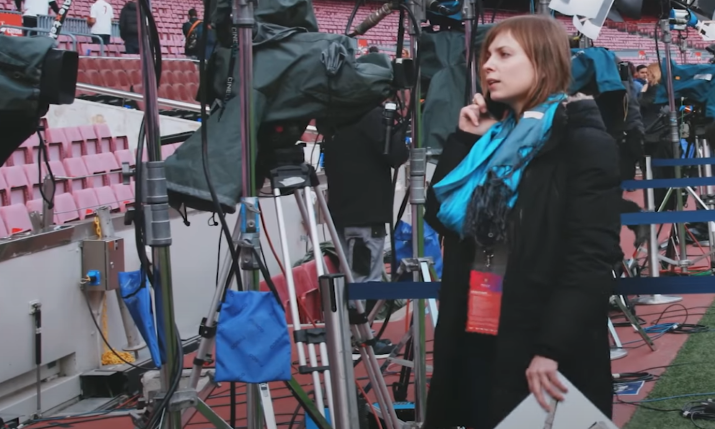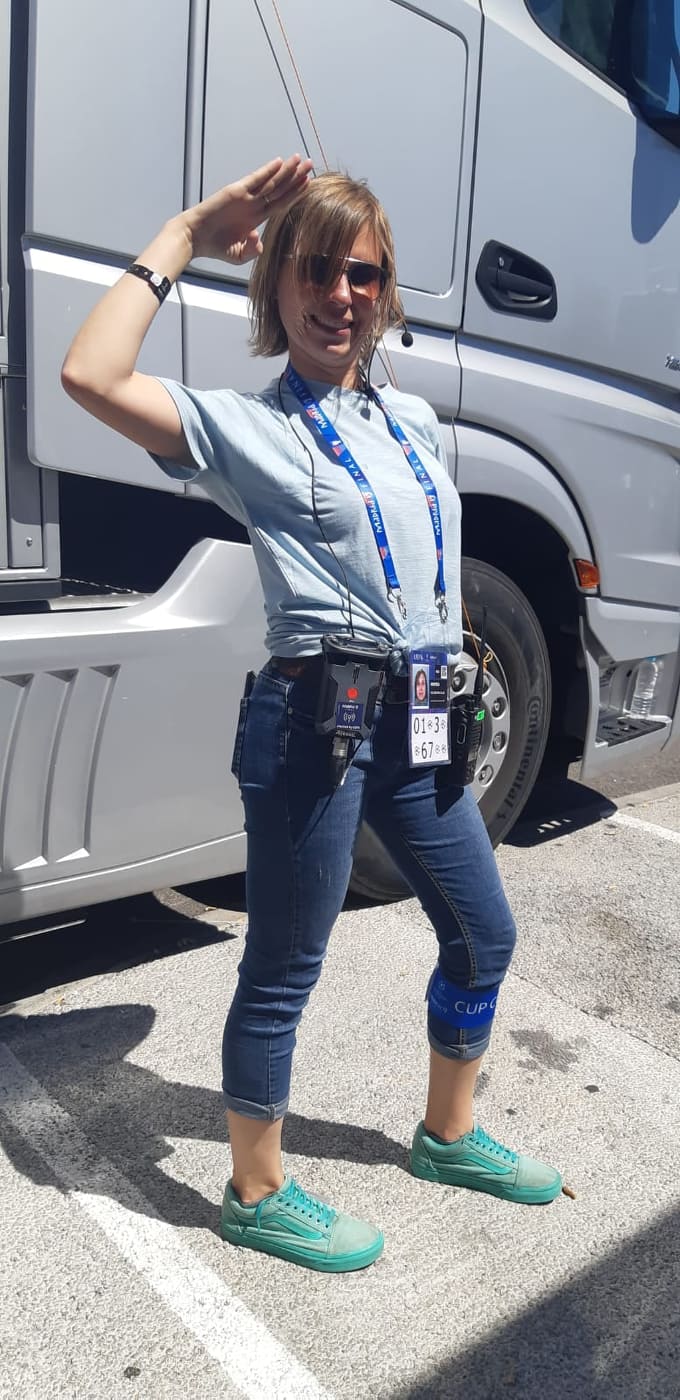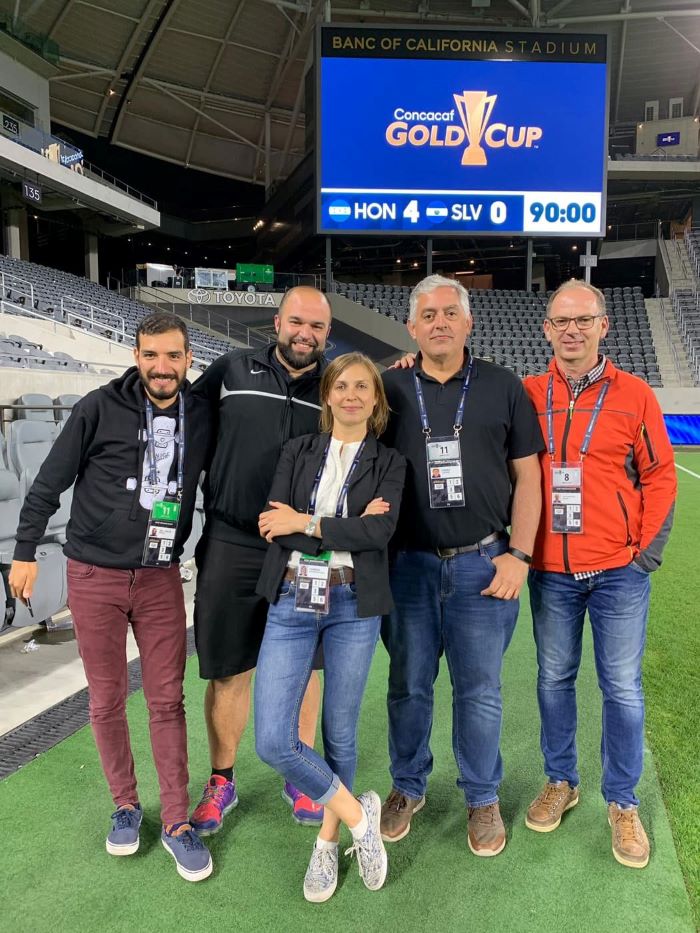Making a lasting impact: Mediapro’s Katarzyna Humska discusses LaLiga, lockdown and learning

Katarzyna Humska, production coordinator at Mediapro, preparing for El Clasico at Camp Nou in 2017
Katarzyna Humska, production coordinator at Mediapro, was raised in Poland but has made her mark in Spain, where she is a key member of the production team for all LaLiga matches.
Humska’s professional career has always been attached to Mediapro and specifically to football. She has been part of some of the company’s major projects including Al Jazeera’s Spanish football coverage, producing special coverage for long-term Mediapro client, LaLiga, plus UEFA Champions League matches.
In 2015 she became part of Mediapro’s Nodal Audiovisual Sport team, which is dedicated to LaLiga match production where she supervises the coordination of logistical and technical information both for the Clubs and technical providers. The team coordinates around 1,000 different productions each season. She also organises on-site producers around the country.
This year, Humska has been a key part of creating the ‘new normal’ within stadiums in terms of health and safety protocols for LaLiga and Mediapro crew since lockdown restrictions eased in Spain. She also tested and introduced Viz Arena virtual fans into LaLiga transmissions.
Fast-lane to the couch
When lockdown began, going from being in the fast-lane working on the Real Madrid versus FC Barcelona match on 1 March, to staying at home, Humska says she felt like it was, “a bucket of cold water over me”.
She goes on: “Even though there was nothing certain about the date of [football’s] return, at Mediapro together with LaLiga we started to analyse the possibilities of reducing staff at the stadiums, defining the minimum quantity of our crew at every zone of the stadium, and studying the viability of each protection measure proposed.
“After finding myself in live production with all its adrenaline and emotions it involves, I easily got trapped by it”
“My job became a constant video call, during which we would evaluate solutions like introducing protection screens in different works spaces, the use of PPEs, disinfection procedure inside the OB vans, at each camera position, remoting EVS and CCU operation, procedures for COVID testing, all without having a clear [view on how or when we would see the return of football].”
She says that once the team knew football would be back imminently, it focused efforts in two main directions: changing camera positions to diminish the visibility of empty stands within the Match Feed and at increasing the distance between staff and the players.
She was also responsible for creating a fake crowd through the use of the Viz Arena graphic solution, and the sound of a virtual public using the EA Sports FIFA game.

Mediapro’s Katarzyna Humska at the UCL Final, Madrid 2019
She adds: “Introducing Viz Arena into the live transmission was totally groundbreaking from my point of view. It required a lot of courage and faith to go for something nobody has ever done before, with experimental solutions in terms of the workflow and not enough time for testing. I think it served as a great example to other leagues and competitions motivating them to search and reach for more.”
Continuing, Humska says that when the resumption of football was announced, the team had to work around the clock to pull everything together. “Once LaLiga decided on how the new football would be, we were in a race against the clock to introduce all those solutions. I and many of my colleagues worked for three weeks without a break, hoping on getting there before the first game. It wasn’t perfect but it was good enough; we would perfect the workflow day by day as the competition didn’t stop not even for a day during a month.”
Humska adds: “We were all fighting for this one goal of ending the season in the best way possible, as if it was a World Cup. This sense of responsibility for the spectacle at all levels was very impressive and made [our team] even closer, while maintaining our [social] distance.”
Humska is still working hard on LaLiga matches, she says. “Since lockdown ended I have been entirely dedicated to LaLiga with no margin of energy nor time to do anything else,” Humska laughs.
“As you may know, we had a small surprise during the last round of LaLiga SmartBank (second division), when six of Fuenlabrada’s players were diagnosed with COVID, so we were struggling to get to the end of the season. The last six matches of play-off (second division teams fighting for getting into LaLiga Santander) were intense.”
Passion for TV
On how Humska first found out about TV broadcasting as a career, says that her mother worked at the local TV channel while Humska was a teenager, which led to her finding out more about broadcasting. She explains: “My mum always used to let me stay at the table chatting with [her friends from work] so I created this vision of the TV world as very interesting and full of people with passion for their jobs and great stories to tell.
“Sports broadcasting wasn’t something I would aim for from the very beginning,” she goes on. “I always liked sports, nevertheless I had been more into fiction rather than into live events. Nevertheless, after finding myself in live production with all its adrenaline and emotions it involves, I easily got trapped by it.”
As a child in the city of Poznań, Poland, Humska developed a zeal for the Spanish language, which shaped her career path in television. Her high school was selected based on that passion, and which also combined the Spanish language with journalism.
She comments: “During that time together with my best friend we started to search for options of university careers and found an article about how great the National Autonomous University of Mexico (UNAM) campus [in Mexico City] was, which [gave us] the idea of moving abroad. Obviously, our parents weren’t very eager to see their daughters move to a different continent and less to Mexico, knowing its fame of a dangerous city. So my mum encouraged me to do a Spanish course in Madrid during summer 2007 in order to find a way to forget Mexico. It worked perfectly; I fell in love with the city and few months later found the career that perfectly suited my [personality]; it was Audiovisual Communication at Complutense University in Madrid, where I moved in 2008.”
Her first job in media was a summer internship at the local Poznań TV station, with help from Humska’s mother’s friend who worked there. She says: “I worked assisting the reporters and even prepared my own footage (about rats that live in old market’s cellars – an easy way of not liking at all the work of a journalist,) but it didn’t feel like my thing.”
Mediapro and football
Her second job has essentially become the focus of her career; Mediapro. She explains: “My second job, this time in production department was at Mediapro when I was studying during my fourth year of university. It also was an internship so I had to reconcile it with my classes and two different jobs (as a waitress and as customer service personnel in a store,) for the first seven months until I got my first contract with the company. I’ve been working for Mediapro ever since.”
At Mediapro Humska immediately began a campaign to get into the sports broadcasting department. Her first sports project was in AV for Loterías y Apuestas del Estado, (LAE), the national lottery, which gave her the chance to find out about the live production of horse races.
“After that, in February 2013 I was moved to Marca TV to form part of its production team, still as an intern but fulfilling the tasks of production second assistant; managing trips, timings, billing of the VIPs that participated in the shows, preparing studios for the recordings, etc. Also during that time I had the chance to assist on a football match as a producer. That sounds much bigger than it actually was; it was a minor encounter that we covered with an ENG crew. Nevertheless, it’s curious to think of it as a warm up of what I would dedicate my professional life at least until now.”
“I think it’s extremely important to not to neglect your friends and your family and have the capacity to delegate well enough to be able to enjoy moments disconnected from your professional life, and dedicated only to them”
It was in the next project that she discovered live football production, which has become her career. This also marked the point where she joined Mediapro as a regular employee, which meant she could drop her other jobs during the fifth and final year of her degree.
“The project was the production service for Al Jazeera (BeIN Sports). Over several years this top Arabic channel had [based its main] studio at Mediapro headquarters in Madrid and, therefore, Mediapro staff were involved in all its Spanish productions,” she says. “When I joined the team, the production for Al Jazeera was reduced to on-site special coverage and arranging recordings, interviews and live connections for the three fixed reporters of the channel in Spain. Each of them would follow the main Spanish teams: Real Madrid, FC Barcelona and Atlético de Madrid.
“During that time I discovered all types of special coverage, from one CAM SNGs for regular matches and up to nine CAM OB can including an on-site studio for the Clasico. Almost every weekend I assisted in a different game of LaLiga, getting to know different stadiums and, as BeIN Sports was also a Champions League rights holder, I assisted in several matches of this competition. Moreover, on daily basis I was coordinating the ENG coverages, footage post production, coordinating live stand ups and satellite playouts with Doha MCR, organising interviews… Those two and a half years were the best school, that gave me the base to what I do nowadays,” she states.

After the last game of the Gold Cup with the Mediapro team [Katarzyna Humska centre], June 2019
In 2015/2016 season LaLiga centralised rights management of Spanish professional football. Along with the necessity of creating an AV product that would increase the value of all LaLiga matches, came the need to reinforcing the team dedicated to football within Mediapro, then and now Laliga’s official production company. This new team would be based in Barcelona, out of Mediapro’s head office.
Comments Humska: “My current boss asked my boss from BeIN for her availability [for this team] but she wasn’t interested in moving from Madrid to Barcelona. She offered me, as she believed I was qualified enough for the position, and I moved to Barcelona in October 2015. Since then, our team has grown almost 2.5 times bigger.”
Adds Humska: “Barcelona is the headquarters of Mediapro and where all the most important projects start. I found it was the best place to be if I was to grow within the company. And this gave me the opportunity of getting to know myself at different levels and having the chance of working not only in LaLiga productions but in many other projects Mediapro is involved in, such as the UCL Final or Gold Cup in the US.”
Exciting and fast paced
Humska’s role at Mediapro is complex and involved due to the volume of work. She explains: “We run around 1,000 productions each season between the first and second division of LaLiga, plus other competitions such as women’s football, handball, and basketball.
“Furthermore, our workflow is unique as we centralise different elements of the production in Mediapro’s Imagina building in Barcelona, where also several live channels are being produced and different playout services take place. It requires time, knowledge, patience and a lot of practice to understand not only how it works but also how each decision will affect other projects or elements of the chain. I’m still learning and have a lot to learn.”
Humska goes on: “Also, on my arrival to Barcelona I had an extra handicap; [I didn’t speak the] Catalan language. Suddenly everyone would speak it at meetings and in email; it didn’t take me long to understand, but it makes a little bit more complicated to learn everything.”
Self-reliance is an important part of achieving well at work, Humska says. She comments: “Another complicated part about learning the role is to believe in yourself and your intuition. On many occasions people expect you to have the answers to their doubts and questions. I think it is not only important to know the answer; you also need to rely in yourself to be able to respond and think correctly especially in a stressful moment. Finally, keeping your job depends on your adaptability; the projects change, clients change, technologies advance. In the end it seems like there is nothing certain or fixed in this business, so to stay within it you need to remain active and up to date.”
However, her job is exciting and fast paced, which Humska revels in. She says: “I enjoy the action. I find it more difficult to work during a [quiet] week without any special event at sight than when I spend days working constantly, preparing for a big match like El Clásico or a Derby. When there is so much to do for an event that is so [anticipated] by many people, it is very satisfying to know you have managed to give the most of you in order to make it happen.”
Challenges and dedication
On challenges she has faced during her career, she says: “Football at the very beginning seemed like the most hostile territory; a great part of the technical crew and management are men who have been working in this business for 10 or even 15 years. Finding yourself as a very young foreigner in a country where a lot of Spanish with more experience are struggling to get a job is challenging. It took time, courage and a lot of work to gain the [trust of the] crew, to demonstrate you’re not there because you’re pretty or a friend of your boss. You are there because you are worth it and your job gives value to the company.”
Reconciling work in live sports broadcasting with a personal life has been the hardest thing about this job, Humska states. “I know many cases (including myself,) when your work becomes your life. Obviously, if you love what you do it doesn’t seem a problem. Nevertheless – at least what I have observed from the people I know – sometimes the price you have to pay for loosing yourself completely in your work may bring you loneliness.”
She concludes: “I think it’s extremely important to not to neglect your friends and your family and have the capacity to delegate well enough to be able to enjoy moments disconnected from your professional life, and dedicated only to them.”
